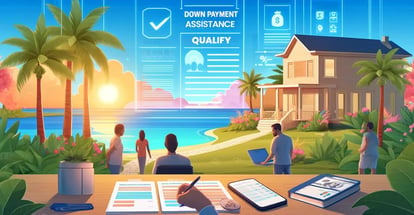Arrive Home Earned Equity Program - Ultimate Guide
Before diving in, it's important to know if both you and the property you're eyeing qualify. This guide breaks down the main things you need to know in clear and simple terms.
What is an Earned Equity Program?
An Earned Equity Program is an innovative approach to homeownership that aids individuals in purchasing a home without the immediate need for a traditional down payment or mortgage.
Instead of buying the property outright, participants enter into an agreement where they earn equity or ownership in the property over time, often through rent payments or other predetermined arrangements.
Over the agreed-upon period, the participants make consistent contributions, which not only cover the cost of living in the property but also count towards building their stake in the home.
At the end of this period, or sometimes at various points during it, the amount they've contributed earns them a portion of the home's value.
This mechanism assists individuals who might not have the means for an immediate large down payment but can commit to regular contributions over time.
The benefit of such programs is that they provide a structured path to homeownership, especially beneficial for those who find the traditional route financially challenging.
By breaking down the acquisition of equity into manageable portions, it ensures that more people can gradually invest in and eventually own property.
In essence, the Earned Equity Program bridges the gap between renting and owning, offering a middle ground for those looking to invest in their future homes incrementally.

Arrive Home Earned Equity Program Overview
The Arrive Home™ Earned Equity Program is a groundbreaking initiative, designed as an alternative route to traditional homeownership.
Instead of requiring an immediate substantial down payment or a standard mortgage, participants enter into an "ownership equity agreement."
In this setup, individuals don't purchase the property outright initially; rather, they accumulate ownership or equity in the home over time through regular contributions.
These contributions go beyond just paying for residing in the property; they also count towards building a stake in the home, effectively bridging the gap between renting and owning.
Eligibility spans across all US citizens, specific categories of non-US citizens, and encompasses a variety of property types, from single-family residences to certain condos.
While the program provides flexibility, it maintains stringent credit guidelines to ensure participants' financial commitment and capability.
With a focus on inclusivity and accessibility, the Arrive Home™ Earned Equity Program paves the way for a more diverse group of individuals to embrace the benefits and security of homeownership.
Eligibility Requirements
To participate in the Arrive Home™ Earned Equity Program, prospective users must satisfy specific eligibility conditions.
Firstly, all US citizens are automatically eligible. For non-US citizens, there are particular requirements to be met.
Lawful Permanent Resident Aliens can participate provided they have a green card and a valid US Social Security Number.
Non-Permanent Resident Aliens are also welcome to join the program if they can present evidence of their capability to repay, typically demonstrated with an Individual Taxpayer Identification Number (ITIN).
Those under the Deferred Action for Childhood Arrivals (DACA) policy are similarly eligible.
Credit Score Requirements
Furthermore, creditworthiness plays a pivotal role in determining user eligibility. At least one credit score from a major bureau is essential.
The baseline credit score is set at 580, though in specific scenarios, scores slightly below this might be considered.
For those who lack a conventional credit score, alternative avenues like verified utility bills or other consistent payment arrangements can be considered.
The program's flexibility also extends to self-employed individuals, provided they meet the minimum credit score eligibility conditions.
It's important to note that while non-occupant consumers might be permissible under the program, their income cannot be the sole qualifying factor.
The primary occupant must have documented income contributing towards the qualifying payment-to-income and debt-to-income ratios.
Similarly, a non-obligated spouse can be considered, but their credit history might be subject to review for potential disqualifying events.
In essence, while the Arrive Home™ Earned Equity Program aims to be inclusive, it also maintains rigorous criteria to ensure the financial stability and commitment of its participants.
Debt-to-Income Requirements
When joining the Arrive Home™ program, there are rules about how much of your income can go towards housing and other debts. This helps ensure you won't be overwhelmed with payments.
Basic Rules
-
Housing Costs - No more than 43% of your monthly income.
- All Debts Combined - No more than 50% of your monthly income. This includes things like car loans, credit card bills, and the housing costs mentioned above.
Special Cases
In some situations, these numbers can be a little higher (46% for housing and 56% for all debts). But there are conditions, and not everyone will qualify for this exception.
Extra Rules
-
If you've faced significant financial challenges like bankruptcy or foreclosure recently, the program sticks strictly to the 43% and 50% rules.
-
If your new house payment is going to be much higher (more than double) than what you're paying now, the program will also use the stricter numbers.
- For those running their own business, or if you have no credit history, there might be even tighter rules.
In simple terms, the program wants to make sure you can comfortably afford your new home without stress. It's always a good idea to chat with a financial advisor or program representative to see where you stand.
Property Eligibility Requirements
For a property to be eligible under the Arrive Home™ Earned Equity Program, it must meet certain specified criteria.
The program encompasses a range of property types including Single-Family Residences (SFR), Planned Unit Developments (PUD), townhomes — whether attached or detached — as well as modular and manufactured homes.
Condominiums are also permissible; however, they must either be approved by the FHA or have documented spot approval to qualify. The program is designed to cater to properties with 1–2 units.
On the contrary, certain properties are explicitly excluded from this program - second homes, investment properties, properties with 3–4 units, and co-operatives (co-ops).
These guidelines ensure that the program remains focused on primary residential properties, reinforcing its primary objective of making homeownership accessible to a broader audience.
Step-by-Step Guide to Apply for the Arrive Home™ Program
Remember, each step is crucial. Always consult with professionals during the process to ensure a smooth journey towards owning your dream home.
-
Research and Understand - Before diving in, familiarize yourself with the Arrive Home™ Earned Equity Program. This will help you understand what the program offers and what it expects from applicants.
-
Verify Eligibility - Use MakeFloridaYourHome to check if you qualify for the program. This will give you a clear picture of whether you meet the requirements to proceed further.
-
Gather Necessary Documents - Assemble all the required documents. This typically includes proof of income, proof of citizenship or residency, and credit history. If you're self-employed or have alternative sources of income, make sure you have those documents as well.
-
Calculate Your Debt-to-Income (DTI) Ratio - Understand how much of your income goes towards debts each month. This will give you an idea of how much house you can afford under the program's guidelines.
-
Choose an Approved Property - Using the property eligibility criteria, select a home that fits within the program's guidelines. Remember to consider properties that are primary residences and fall within the allowed categories.
-
Reach Out to an Advisor or Lender - Connect with an approved lender or financial advisor familiar with the Arrive Home™ program. They can guide you through the finer details and help ensure a smooth application process.
-
Submit Your Application - Once you have all your paperwork in order and have chosen a suitable property, submit your application. Ensure all details are accurate to avoid any delays.
-
Wait for Approval - After submitting your application, there will be a review process. This can take varying amounts of time depending on the volume of applications and the completeness of your submission.
-
Finalize the Agreement - Once approved, you'll enter into the "ownership equity agreement" with the Arrive Home™ program. This outlines the terms of your participation and the path to homeownership.
- Celebrate and Move In - After all the paperwork is finalized and you've been approved, it's time to celebrate. You're now on your way to homeownership through the Arrive Home™ Earned Equity Program.
Arrive Home Down Payment Assistance Program
Arrive Home also has a down payment assistance program for borrowers who want to buy a home the more traditional way.
The Arrive Home™ Down Payment Assistance Program is designed to assist individuals who are purchasing a home by providing financial support for the down payment.
The program has two primary structures:
The first structure provides down payment assistance of either 3.5% or 5%, which needs to be repaid. This repayable form acts as a second mortgage with a 10-year term and carries an interest rate that is 2% higher than the FHA first mortgage rate.
The assistance amount is determined by the lesser value of either the home's purchase price or its appraised value.
The second structure offers 3.5% down payment assistance, which is forgivable. This forgivable format has a 30-year term with no associated interest or monthly payments. The amount is based on the lesser of the home's purchase price or appraised value.
After the borrower completes 36 consecutive on-time payments on their FHA first mortgage, the down payment assistance becomes forgivable. However, specific conditions, like a late payment, can affect its status.
Other Down Payment Assistance Programs
Beyond the Arrive Home™ Program, numerous down payment assistance programs exist for potential homeowners.
Chenoa Fund Program Overview
The Chenoa Fund Program is recognized nationwide for assisting individuals in attaining homeownership, especially those facing down payment challenges.
The Chenoa Fund provides secondary financing, helping buyers navigate financial barriers. This program stands out due to its versatility, presenting various products to cater to diverse borrower needs, from forgivable and repayable down payment assistance loans to specific zero-interest alternatives.
It's compatible with FHA loans, offering an integrated homeownership solution for those with restricted initial resources. Eligibility criteria include a minimum credit score of 620 and a debt-to-income (DTI) ratio under 50%.
Additionally, borrowers must partake in homeownership counseling. An income limit also applies, based on regional median incomes, and the property should be the buyer's primary residence.
Florida Hometown Heroes Program Overview
The Florida Hometown Heroes Program is a state initiative designed to support Florida's working population. This program, contrary to its name, is open to all employed residents of Florida.
Its main objective is to facilitate homeownership through down payment assistance. Due to its success, the state increased its down payment assistance cap to $35,000 for 2023-2024.
A distinctive feature is its focus on community cohesion, endorsing home purchases near workplaces to enhance local ties and minimize commutes.
Eligibility criteria encompass being a first-time homebuyer, having a credit score of at least 640, and adhering to income limits set by HUD.
Additionally, the program requires employment within Florida and the property's location to coincide with the applicant's work community.
Rocket Mortgage ONE+ Program Overview
Rocket Mortgage's ONE+ program aims to lower the down payment burden for potential homeowners. Under this scheme, buyers contribute 1% of the home's value, with Rocket Mortgage adding a 2% grant, totaling 3% equity.
Accessible to both new and experienced buyers, this program eliminates the need for mortgage insurance. Eligibility requirements include an income cap set at 80% of the area's median income and a FICO® Score of 620 or higher.
The purchased property should be a single-unit and primary residence. The combined down payment and grant should not exceed 5% of the home's value.
FHA Loan Overview
Introduced in 1934 by the Federal Housing Administration, the FHA loan program offers an alternative to standard loans, primarily due to its reduced down payment.
With government backing, these loans present lenders with diminished risks, enabling borrowers to benefit from flexible criteria.
FHA loan qualifications include a variable down payment based on credit score, with 3.5% required for scores of 580 or above and 10% for scores between 500-579.
The program recommends a DTI ratio under 43%. Only primary residences qualify. FHA loans also necessitate two insurance types - an upfront premium and an annual premium.
Bottom Line
The Arrive Home™ Earned Equity Program is a government-initiated strategy to facilitate homeownership without the immediate requirement for traditional down payments or mortgages.
It operates on an "ownership equity agreement", allowing participants to earn equity in a property over time. This program stands out as a bridge between renting and owning, with an emphasis on inclusivity and financial accessibility.
To participate, both individual and property must meet specified eligibility criteria, which encompass citizenship, creditworthiness, debt-to-income ratios, and property type.
For those interested in a more conventional path, the Arrive Home™ Down Payment Assistance Program offers two primary structures to assist with down payments.
Besides the Arrive Home™ offerings, multiple programs such as the Chenoa Fund Program, Florida Hometown Heroes Program, Rocket Mortgage ONE+ Program, and FHA loans exist to assist potential homeowners.
Each program has distinct features and eligibility requirements tailored to various needs, ensuring a broader range of individuals can access the benefits of homeownership.
With over 50 years of mortgage industry experience, we are here to help you achieve the American dream of owning a home. We strive to provide the best education before, during, and after you buy a home. Our advice is based on experience with Phil Ganz and Team closing over One billion dollars and helping countless families.

About Author - Phil Ganz
Phil Ganz has over 20+ years of experience in the residential financing space. With over a billion dollars of funded loans, Phil helps homebuyers configure the perfect mortgage plan. Whether it's your first home, a complex multiple-property purchase, or anything in between, Phil has the experience to help you achieve your goals.


 By
By  Edited by
Edited by 






